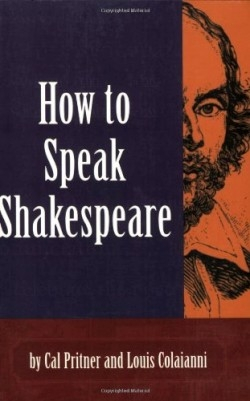How to Speak Shakespeare
“Speak the speech, I pray you, as I pronounced it to you, trippingly on the tongue. But if you mouth it, as many of our players do, I had as lief the town crier spoke my lines.” (Hamlet, III, ii, 1) These are Hamlet’s initial instructions to the players who will help him “catch the conscience of the King.” It is as though the authors had the town crier in mind as they wrote this book.
Drawing on over twenty years of teaching and research, Pritner and Colaianni set forth a text that helps “actors communicate Shakespeare’s ideas and stories clearly for audiences.” Creating a step-by-step process, the authors have compiled lessons based on principles that have proven effective for students from eighth grade to undergraduate theater majors to professional actors. Although a minimum of familiarity with Romeo and Juliet is essential, even a novice can till this volume and expect a good harvest. The serious student of Shakespeare will find it indispensable.
The book takes a clear approach to presenting, analyzing, and ultimately explicating not only Shakespeare’s words, but the intent, meaning, and sound that must be interwoven to bring the Bard’s true genius to life. From explanations to exercises that help the reader apply the techniques, Printer and Colaianni have designed a college course that lacks the intimidation and expense of enrolling at a local university.
How to Speak Shakespeare is written primarily for the thespian, with sections that cover topics such as punctuation and syllable stress, as well as the stimulus-response method of understanding and, more importantly, communicating the meaning of Shakespearian text. The authors use The Tragedy of Romeo and Juliet as their example play for all their concepts and exercises. This allows each lesson to build upon the last. Although a Shakespearian scholar may quibble with some of the finer details—the Bard’s use of punctuation for instance—the intent and structure, not to mention the overall concept of the text, are sound and will make this book indispensable for any student, regardless of background, age, or motivation. Perhaps, after reading this book, even a few town criers will improve their ability to speak the speech of Shakespeare “trippingly on the tongue.”
Disclosure: This article is not an endorsement, but a review. The publisher of this book provided free copies of the book to have their book reviewed by a professional reviewer. No fee was paid by the publisher for this review. Foreword Reviews only recommends books that we love. Foreword Magazine, Inc. is disclosing this in accordance with the Federal Trade Commission’s 16 CFR, Part 255.

